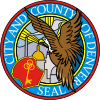Cathedral Basilica of the Immaculate Conception (Denver)
| Cathedral Basilica of the Immaculate Conception | |
|---|---|
 | |
| 39°44′25.01″N 104°58′54.98″W / 39.7402806°N 104.9819389°W | |
| Location | 401 East Colfax Avenue Denver, Colorado |
| Country | United States |
| Denomination | Roman Catholic Church |
| Website | www |
| History | |
| Founded | 1860 |
| Consecrated | 1921 |
| Architecture | |
| Style | Gothic Revival |
| Groundbreaking | 1906 |
| Completed | 1921 |
| Specifications | |
| Capacity | 895 |
| Number of spires | Two |
| Spire height | 221 ft (67 m) |
| Materials | Granite, Limestone |
| Administration | |
| Archdiocese | Archdiocese of Denver |
| Clergy | |
| Archbishop | Most Rev. Samuel J. Aquila |
| Rector | Very Rev. Samuel Morehead |
| Designated | March 3, 1975 |
| Reference no. | 7500506[1] |
| Reference no. | 5DV.111 |
The Cathedral Basilica of the Immaculate Conception is the cathedral of the Archdiocese of Denver of the Roman Catholic Church. It is located at the corner of Logan Street and Colfax Avenue in the North Capitol Hill neighborhood of central Denver.
History
[edit]Construction of the cathedral started in 1902 and was completed in 1911 with a final cost of approximately $500,000. The inaugural Mass was held on October 27, 1912, and consecration was in 1921. On August 7, 1912, lightning struck the west tower causing damage to the upper 25 feet (7.6 m); however, this was repaired before the opening.
The cathedral was raised to the status of minor basilica on Christmas Day 1979. On August 13 and 14, 1993 (for World Youth Day), Pope John Paul II celebrated Mass at the cathedral, one of only a few cathedrals in the United States so honored. In June 1997, lightning struck a second time, but this time damaged the east tower. The parish completed work to restore the tower within eight months.[2]
During the first days of the George Floyd protests from May 29 to June 1, 2020, the cathedral basilica was vandalized multiple times by protesters. Damage included arson, spray-painted anti-Catholic phrases, and police tear gas penetrating the building. No one in the cathedral basilica was injured during the protests.[3]
In October 2021 the cathedral was vandalized again with graffiti being sprayed on doors and statues around the cathedral. It was the latest in a spate of vandalism against Catholic churches in Colorado which had damaged at least 25 other church buildings.[4]
Architecture
[edit]Architect Leon Coquard of Detroit designed the cathedral in the French Gothic style.[5] Its character is influenced by the 13th-century Saint Nicholas Collegiate church (collégiale Saint-Nicolas) of Munster, Moselle, France, which is the birthplace of Bishop Nicholas Chrysostom Matz, who supervised cathedral construction.[6]
The building is in the shape of a Latin cross measuring 195 by 116 feet (59 by 35 m) with the nave rising to 68 feet (21 m). The main façade houses three entrances and is framed by two 221-foot (67 m) spires. The structure is constructed of Indiana limestone and granite from Gunnison, Colorado. The altar, statuary, and bishop's chair are all made of Carrara marble, while other elements feature Yule marble stone from Marble, Colorado.[7] The 75 stained glass windows are from the Royal Bavarian Art Institute in Munich founded by Franz Xaver Zettler. The church has the most leaded stained glass of any church in North America. When opened, the cathedral could accommodate 1,000 worshipers. However, due to significant alterations following the liturgical reforms initiated at the Second Vatican Council (including the removal of the historic stone altar rail and the expansion of the chancel to accommodate a second, freestanding altar) the church now accommodates 895.[2][5]
Ministries
[edit]The cathedral offers three daily and six Sunday Masses as well as other sacraments regularly. Additional services to the community include the yearly provision of 50,000–60,000 lunches to the poor in the area.[2]
See also
[edit]- Julia Greeley
- List of Catholic cathedrals in the United States
- List of cathedrals in the United States
- Roman Catholic Marian churches
- Yule marble
References
[edit]- ^ "National Register Information System". National Register of Historic Places. National Park Service. July 9, 2010.
- ^ a b c "History of the Cathedral". Cathedral Basilica of the Immaculate Conception. Archived from the original on March 4, 2016. Retrieved March 11, 2016.
- ^ "Homily and Reflection (1 June 2020)" (PDF). denvercathedral.org. Cathedral Basilica of the Immaculate Conception (Denver). June 1, 2020. Archived from the original (PDF) on December 21, 2020. Retrieved December 21, 2020.
- ^ McKeown, Jonah (October 11, 2021). "Denver cathedral vandalized with anti-Catholic slogans". Catholic News Agency. Retrieved October 12, 2021.
- ^ a b "Architectural Highlights". Cathedral Basilica of the Immaculate Conception. Archived from the original on February 29, 2016. Retrieved March 11, 2016.
- ^ "Munster Denver" (in French). Nature et Patrimoine du Saulnois. Archived from the original on July 14, 2012. Retrieved December 28, 2006.
- ^ "Historic Resources of Marble, Colorado, and Vicinity". History Colorado. Retrieved May 25, 2020.
External links
[edit]- Roman Catholic churches in Denver
- Basilica churches in the United States
- Roman Catholic cathedrals in Colorado
- Roman Catholic churches completed in 1911
- Colorado State Register of Historic Properties
- Churches on the National Register of Historic Places in Colorado
- National Register of Historic Places in Denver
- Religious organizations established in 1860
- Gothic Revival church buildings in Colorado
- 20th-century Roman Catholic church buildings in the United States




